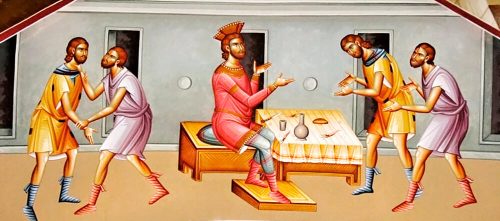
On the 11th Sunday after Pentecost, we heard the parable of the unforgiving debtor. The Lord tells us that Kingdom of Heaven is like unto a rich man who settles his accounts with his servants. One servant owes him 10,000 talents, an exorbitant sum, but when the servant pleads him fervently, the master forgives the debt. That servant meets another servant who owed him a tiny amount, 100 denarii. Although the first servant had just been shown clemency, he took the second servant by the throat, threatening him and even throwing him into prison, and remaining hardened to the latter’s many pleas and promises. When the master hears of this, he calls the first servant and asks if, after he had been forgiven so great a debt, he should not have likewise shown compassion (cf. Matthew 18:23-35)
So, God likens His Kingdom to this parable in the sense that, if we do not imitate Him in His mercy, we will not be fit to enter His Kingdom.
The Lord alludes here to the many mistakes and debts – 10,000 talents – that God forgives us. We know from the Desert Fathers, for example, that a brother asks Abba Pimen: “If a man falls into sin and then returns, does God forgive him?” And the elder responds: “If God commanded people to forgive, wouldn’t he forgive even more readily? Because he commanded Peter to (forgive) seventy times seven (cf. Matthew 18:22).” But these debts, these sins against God are so great that they cannot ever be paid back. When someone errs against another person, it amounts to a debt of 100 denarii, but when we err against God, the debt is much larger, 10,000 talents. The difference is incomparable. Therefore, this parable urges us to forgive those who trespass against us just as our Father does when we ask Him to forgive our trespasses (cf. Matthew 6:12).
Of course, it’s easy to be an outside observer and to think: what a wicked man, what a heartless man who refuses to forgive even a little when he himself was forgiven so much. But the Lord did not say this parable in vain, and the Church puts it before us each year. The reason is that we are all like this worthless servant. Worthless in the sense of ungrateful, greedy, unkind. We grow indignant to learn that such a person exists, but in fact we are not far from his behavior. More precisely, we receive a blessing, we earn some money or regain our health, and we tend to swallow these up in our egotism. We tend to consider that we deserved this, that this is normal, that things ought to go well in our life. We are spoiled. We’ve learned to live with various expectations, and our egotism has inflated greatly. In this way, we end up applying the same principle even with God. I saw that today He forgave me because I entreated Him with tears and repentance. I’ll ask Him again tomorrow and the day after to forgive me. We apply the same arrogant, spoiled attitude with regards to Him. He can forgive me 10,000 talents, that’s how it ought to be, that’s what ought to happen. I have no obligations. This is pure egotism and it never ends.
This is one way we can understand this parable and the scandalous behavior of the ungrateful servant. Another key to understanding is that each of us are slaves to our own plans. We all have plans; we have unsurmountable difficulties. God helps us, but we interpret everything as if it leads to fulfilling our plans. We subordinate everything to our way of being, to our project. And we end up behaving like this servant. This hides great egotism, which like a black hole absorbs and swallows everything you give it. And these plans of ours continue to pressure us, to burned us, even after we manage to surpass many event horizons that seemed impossible to resolve. It’s not easy. And we don’t only harness ourselves into our plans, but we harness God into them, too. So, God ought to forgive me 10,000 talents, and whoever owes me 100 denarii ought to pay me back, because otherwise my plan will fail.
In both interpretations of this parable, we deal with our terrible egotism, which is the greatest enemy of our salvation. This egotism is our god, as Elder Aimilianos of Simonos Petra says. We serve it and we offer sacrifice to it every day. And we even make God serve our egotism. It’s terrible!
Of course, we need to counteract this. And we do this, firstly, by reflecting that we don’t deserve anything, that we are nothing. And, secondly, by thinking that what is important is not me, but God and His plans. As it says in a prayer: “Lord, I know that You do all that You desire, so may Your will be also in me, the sinner.” This is a great daily prayer, through which a person can wake up. Why do be fret so much, don’t we know that God is master of all?! We have God Who takes care of everything.
There is another aspect of this parable that also is worth commenting. If we pay attention, we’ll observe that we act in one way with our superiors, and in a totally different way with our juniors. We can each observe how gentle, generous, and kind we act toward our bosses, and how different we act toward our subordinates. Moreover, we forgive our superiors almost any sort of behavior, even abuses. But if someone who is our junior acts arrogantly toward us, we light up with anger. It would be more correct to have the same behavior for our superiors as for our juniors. This is what today’s parable teaches us. Our Lord acts with the same kindness toward all. And He invites us to do likewise.
